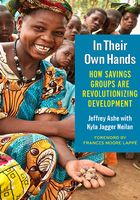
Kouloukoura
Bintou was thinking about rain as she wiped sweat off her forehead and put down the short hoe she used for weeding. Hours before noon, the day was already hot. Bintou lives in Kouloukoura, Mali, a midsize village of a few thousand people located in Mali’s expansive Koulikoro region. The region is tucked below the Sahara desert to the north, where agriculture gives way to cattle herding. Kouloukoura, like many of Mali’s villages south of the desert, receives enough rainfall for villagers to cultivate many crops; the size of the harvest, though, is extremely vulnerable to the impacts of seasonal rains and drought.

Location of Mali in Africa
Bintou was eager to cut short her time in the field to attend her Saving for Change meeting, even if it meant for-going an hour or two of work she could do before the sun got unbearable. She hadn’t seen some of the women in her group since the last meeting and was excited for the chance to catch up. She made one last sweeping glance over her fruiting tomato plants before bending down to hoist a wicker basket onto her head, overflowing with peanuts she’d brought out of storage earlier that morning. She walked briskly down a well-trampled path of off-white, hard sand, glancing across the small cornfields and tight stands of trees near her home.
As she walked, Bintou poked her head in the entryways of neighbors busy inside the low walls of their household yards. Each wall surrounded an open-air living space bordered by a few mud houses with thatched or tin roofs, round thatched granaries, and shoulder-high, open-roofed latrines and bathing rooms. Some of the yards had small gardens like Bintou’s within their walls or just outside. Most were bustling with little kids and three generations of women cooking over pots perched on stones, over coals fueled by firewood the women had collected earlier. Other women pounded millet in big wooden mortars with heavy four-foot-long pestles. In one yard, two teenagers were throwing the pestles into the air and seeing how many times they could clap their hands before catching the mortar as it fell. The rhythmic knock of the mortar provided a steady beat under everyone else’s movements.
At this time of morning, most men were out tending their corn and millet fields, while the women were up and about, finishing chores before heading out to the fields to join their husbands. Of course, they still had time to pause and ask after Bintou’s health and that of her family as she went by.